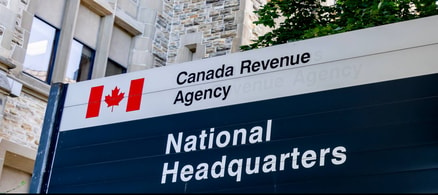Paying your tax bill is crucial
Owing money to the government isn’t something you can simply ignore.
The consequences of ignoring your debts can be harsh. Not only do you put your credit score at risk, the CRA can send the debt to third-party collections, garnish your wages or put a lien on or seize any of your assets.
“All roads lead to you having to pay the money back,” says Scorgie. “It’s not like you’re going to get out of it unless there was an error on the CRA’s end of things.”
Maximize Your Tax Refund with TurboTax Canada!
Simplify tax season with this user-friendly software. Get step-by-step guidance, maximize deductions, and file with confidence. Trusted by millions, TurboTax Canada ensures accuracy and peace of mind. Start your taxes today and get the refund you deserve
Get the tax refund you deserve1. Talk to the CRA

“The CRA is willing and wants to work with you to give you a little bit of a runway to pay this back,” says Scorgie.
If you can’t pay in full or make the minimum monthly payments the CRA offers, the tax agency may set you up with a payment plan or agree to reduce your debt.
While your debt will gain interest until it’s fully paid off, if you can show that you have tried to pay off what you owe by reducing your expenses or borrowing money, the CRA will work with you to come up with a reasonable amount and payment period.
And for those who owe for the COVID benefits they received last year, as long as you filed your taxes on time and earned less than $75,000 in taxable income, any interest on what you owe for your benefits will be waived until Apr. 30, 2022.
2. Make a plan

Before you can tackle your debt, you need to make a plan. If you don’t already have a household budget, now’s the perfect time to draw one up.
Once that’s done, Scorgie suggests earmarking a certain amount to pay back on a monthly basis.
“The great news is that a lot of this can be done through your online banking just by setting it up as an automatic transaction,” says Scorgie.
And if you don’t have enough income to make your payments as well as keep the lights on and food on the table, that’s a good sign you should reach out to the CRA for help.
If you need to bring in more money, you can also consider freelancing.You can turn a skill or hobby into a profitable side hustle and make it easier to manage your payments.
Grow Your Savings Effortlessly with Moka
Automate your savings with every purchase and watch your money multiply. Moka rounds up your transactions and invests the spare change. Start building wealth effortlessly today. Join thousands of Canadians embracing financial freedom with Moka
Sign up now3. Take all the time you’re given

Scorgie says most people don’t realize you’ll have a little time to pay the money back. She suggests taking advantage of all the cushion that’s offered to you.
“Slow and steady is going to be your advantage in getting you out of this,” Scorgie says.
The CRA also has resources on its website for you to calculate what you can actually afford to pay, how long it will take and the total amount of interest you’ll end up owing.
Scorgie recommends going back to your budget, setting up a plan that is realistic and asking for accommodations if you need it.
4. Strategize and be prepared to adapt

Once you’re on track with your payment plan, you can set yourself up for success next year with a strategy to minimize your liability this year.
Scorgie says start by contributing regularly to an RRSP. That will not only prepare you for retirement, but ensures you’ll offset your tax liability next year.
Then, make a point of holding onto your receipts for everything from medical bills to transportation to child-related expenses.
“People just throw out their paperwork and then they kick themselves at tax season,” says Scorgie. “Don’t let that be you; err on the side of keeping your receipts to see if they’re tax eligible.”
And keep your eyes peeled for news of benefits or tax credits that apply to you — like the tax credit that was offered in 2020 for those working from home during the pandemic — that could be helpful come next spring.
5. When in doubt, hire a professional

Finally, when it comes to taxes, if you’re not sure about anything, never just guess.
“Time and again, we unfortunately see DIY gone wrong with taxes,” says Scorgie. “If you’re uncertain, work with a professional.”
Scorgie says it’s not as expensive as you may think and it can save you a ton of trouble, paperwork and money over the long term.
What to do to take the pressure off your wallet

If you’re struggling with how to put together the cash to pay down your bill, here are some tips to help ease the burden and boost your income.
-
Try investing. If you have even a little to spare, dipping your toe into investing using a popular app can be a great way to try and generate a little extra money. You can start small and eventually turn that spare cash into a diversified portfolio.
-
Build your sweat equity. Are you handy or have some time on your hands to help people move, clean or with repair work? Why not set up a profile where you can offer your labour in exchange for cash.
-
Reward yourself for shopping. Download a cash back rewards app that will give you cold hard cash every time you shop at some of your favourite retailers.
Sponsored
Trade Smarter, Today
With CIBC Investor's Edge, kick-start your portfolio with 100 free trades and up to $4,500 cash back.







